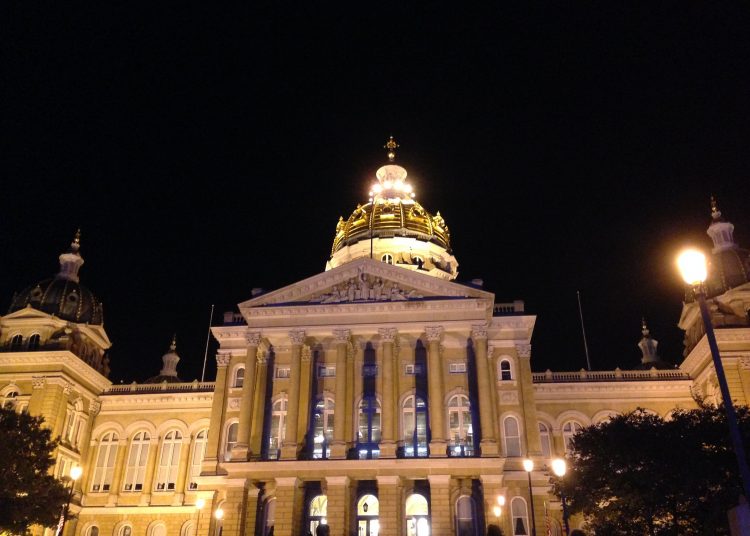DES MOINES, Iowa – The Iowa House, after a marathon debate, passed HF 813, a bill that expands Iowa’s charter school law, early Thursday morning by a 55 to 40 party-line vote.
Iowa’s current law only allows schools to obtain charters through the approval and oversight of local school districts, providing another public education option for parents. Charter schools now can only operate within the boundaries of the school district. There are only two authorized charter schools in the state, both high schools, one in Storm Lake and the other in Maynard.
The existing charter schools will continue to operate under the current code, but no new charter school can start under that chapter if the bill becomes law. HF 813 creates a new code chapter with two charter school models – the school board – state board model and the founding group – state board model.
The state board of education can approve charter school requests from founding groups created by local school districts who would operate a charter school within and as part of a school district as a new attendance center, part of an existing attendance center, or by converting an existing attendance center.
HF 813 also allows the state board of education to approve charter schools established by independent founding groups that create a charter school within the state’s boundaries that operates as a new attendance center independently from a public school district. The charter school would be overseen by a governing board, either elected or selected, based on the charter school’s contract with the state.
The governing board would be required to have a majority of members from the charter school’s geographical area. Those members not from the geographical area must be residents of Iowa. Governing board meetings would fall under the open meetings law, and the budget would be required to be made public.
The bill requires the Iowa Department of Education to monitor charter schools’ progress and establishes application and approval criteria for the state board of education to implement. Charter school contracts can be granted for five-year terms.
What makes charter schools unique is that they are exempt from all state statutes and rules and any local rule, regulation, or policy applicable to non-charter schools except for health and safety regulations and laws, nondiscrimination laws, they must be non-sectarian and non-religious, tuition-free, provide special education services, audit requirements, and transportation requirements.
Charter schools are also required to follow assessment and academic standards requirements under Iowa Code unless the state board of education provides a waiver in their application process. Charter schools under this bill must hire licensed teachers with the appropriate endorsements in the subjects they will teach.
The state board of education can also revoke a charter school charter if it fails to meet its contractual obligations, and the state board of education can deny a renewal request.
Each student enrolled in a charter school established under the bill is counted, for state school foundation purposes, in the student’s district of residence. Those districts are then responsible for paying the charter school an amount equal to the state cost per pupil during the previous school year, and the teacher leadership supplement state cost per pupil. There are additional funds required if a student is a non-English speaker or if a student is eligible for a postsecondary enrollment options program. One exception would be the first year that a former homeschool or private school student attends a charter school. In those cases, the state would pay.
The debate started Wednesday evening and did not conclude until almost 1:00 am on Thursday. Democrats attempted 30 amendments that failed to pass or were ruled not germane. State Rep. Skyler Wheeler, R-Orange City, the bill’s sponsor, Chad Ingels, R-Randalia, and Garrett Gobble, R-Ankeny, offered amendments that were adopted.
Wheeler quoted President Barack Obama’s remarks about charter schools in his opening remarks and then explained its purpose before amendments were discussed.
State Rep. RasTafari Smith, D-Waterloo, said he was suspicious of out-of-state groups coming into the state to start charter schools.
“I have confidence in the community that makes up this great state of Iowa. But I will say this, I do have some stranger danger about the out-of-state groups that want to come in and make a profit with Iowa taxpayer dollars profit off of our students, especially at the expense of our public schools,” he said.
He offered an amendment requiring community oversight instead of going through the Iowa State Board of Education.
Wheeler countered that the ability to go to the Iowa State Board of Education for a charter is the most significant change with Iowa’s current law. He said it is important that parents who want to start a charter school shouldn’t have to get permission from the local school district.
“If we went ahead and said in the city of Des Moines, HyVee was in control of whether or not Fairway or Aldis got to come into town. Do you think for one second, that HyVee would ever sign off on a Fairway or Aldis coming into town? They would not, it would be direct competition,” he said.
“When we talk tonight, and we ask ourselves a question, it shouldn’t be. Are we funding systems? It should be, are we funding students? And are we doing what’s best for each individual kid in the state of Iowa?” Wheeler added.
Later, State Rep. Mary Mascher, D-Iowa City, offered an amendment that would require a petition of signatures of 100 eligible voters in a community or 30 percent of the voters who participated in the last school board election before a charter school would be allowed. It would also require a public hearing.
“The people in that school district should have the right to determine whether they want that charter in their community,” she said.
Wheeler pointed out that if the community doesn’t support the charter and does not send their students, it won’t survive.
Democrats also offered various amendments dealing with collective bargaining for staff under Chapter 20 in the Iowa Code.
“You have to remember that no one is requiring anybody work at these charter schools,” Wheeler remarked.
Mascher also offered amendments requiring charter schools to post a surety bond and maintain the same days and hours as regular public schools. It failed.
State Rep. Molly Donahue, R-Cedar Rapids, offered an amendment that would require that voters approve a charter school in a referendum.
Wheeler countered, reiterating a previous point, “These schools are not going to survive, these charter schools are not going to survive unless they have people from the community going to the charter school and investing in the charter school, investing time in the charter school, etc.”
With the adoption of an amendment by Wheeler, which required state payments of former homeschooling and private school students attending a charter school for the first year, the bill had to be referred to the House Appropriations Committee to avoid conflict Rule 32. The House had to vote to suspend Rule 75 that prevents votes after midnight so the chamber could resume debate after the committee meeting.
Shortly before midnight, they picked with debate over an amendment offered by State Rep. Cindy Winckler, D-Davenport, that stated that persons or the education services provider that is part of the founding group, not be compensated by the charter school.
State Rep. Sharon Steckman, D-Mason City, argued that the current bill practically replicates existing charter school law.
“The only thing I can see is this, this bill that we’re looking at now creates a whole new section with almost the same things that are in the charter schools now except no local control by elected people,” she said.
“I think this bill is not about kids. It’s about money,” Steckman added.
Democrats were concerned about the founding members profiting from a charter.
“What has been said on the floor tonight is that the founding group is going to start up, and they’re going to just take the money and run, and that cannot happen,” Wheeler said, answering a question from State Rep. Christina Bohannan, D-Iowa City, asked.
After voting down Winckler’s amendment, the House proceeded to move through the remaining amendments without debate since it was past midnight.
In his closing comments, Wheeler addressed several of the statements made by Democrats and then spoke in support of the bill.
“(The charter school issue) is entirely about opportunity and choice for parents and students in the state of Iowa. Parents know what’s best on how and where to educate their students and their children. Students all have different needs and perform better in different settings. Some students, as I’ve said several times, I’ll continue to say they will do better; most students will do better in a traditional brick and mortar public school. Some will do well in private school. Some will have success in homeschooling. Some perform better in an online setting. And as we’ve seen evident across the nation, some will have great success in a charter school,” he said.
“If we believe in parents, and I believe in parents, I’m a parent. And we believe that they have the best interest at heart when it comes to where and how to educate their children. And I believe that then we need to give them as many options as possible,” Wheeler added.
“Competition is not a bad thing,” he stated.
“What are we actually funding? Are we funding systems? Are we funding the status quo? Are we funding students? I argue strongly tonight, and I’m very passionate that we should fund students and not systems. This bill comes down to our kids and their futures. It is incumbent upon us in the legislature to seek every opportunity possible to fit each unique, individual student and their needs in our great state,” Wheeler concluded.
After the vote, Speaker Pat Grassley, R-New Hartford, released the following statement.
“As we entered this session, our caucus laid out parental choice in education as one of its top priorities. With this legislation, parents and students will have an additional choice for their education. House Republicans said we’d deliver on parental choice in education and yet again, that’s exactly what we’ve done,” he said.
Listen to the full debate below:















